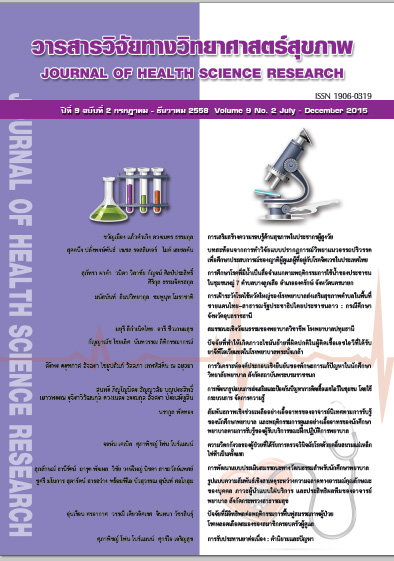การพัฒนารูปแบบการส่งเสริมและป้องกันปัญหาการติดเชื้อเอชไอวี ในชุมชน โดยใช้กระบวนการจัดการความรู
Main Article Content
บทคัดย่อ
การวิจัยและพัฒนาต่อยอดรูปแบบ HIFI Model (Health, Information, Friendly, Integration Model) โดยใช้กระบวนการจัดการความรู้เพื่อส่งเสริมและป้องกัน ปัญหาการติดเชื้อเอชไอวีในประเด็นของการมีเพศสัมพันธ์อย่างปลอดภัย และวัดระดับความรู้และทัศนคติในเรื่องการมีเพศสัมพันธ์อย่างปลอดภัย กลุ่มตัวอย่าง คือ กลุ่มเครือข่ายคณะอนุกรรมการป้องกันและแก้ไขปัญหาเอดส์ จังหวัดนนทบุรี จำนวน 12 คน เลือกแบบเจาะจง และประชาชนกลุ่มเสี่ยงได้แก่ กลุ่มเยาวชน พนักงานบริการหญิง กลุ่มชายรักชาย ผู้ใช้ยาเสพติด และกลุ่มแรงงานข้ามชาติ จำนวน 100 คน เลือกแบบสมัครใจ เครื่องมือที่ใช้ประกอบด้วย 1) รูปแบบ HIFI Model และ 2) แบบสอบถามความรู้และทัศนคติในเรื่องการมีเพศสัมพันธ์อย่างปลอดภัย ผลการวิจัย พบว่า ได้รูปแบบไฮไฟแอลเซน (HIFI-ALSEN Model: Health, Information, Friendly, Integration, Appropriateness, Life Style, Safety, Economic and Network) ที่มีการขยายเครือข่ายและใช้การมีส่วนร่วม ที่มีความเหมาะสมในการนำมาใช้ส่งเสริมและป้องกันปัญหาการติดเชื้อเอชไอวีในประเด็นของการมีเพศสัมพันธ์อย่างปลอดภัย กลุ่มตัวอย่างมีค่าคะแนนเฉลี่ยของความรู้อยู่ในระดับปานกลาง (X= 8.64, SD = 2.71) และทัศนคติต่อการมีเพศสัมพันธ์อย่างปลอดภัยอยู่ในระดับน้อย (X= 13.60, SD =4.64) องค์กรที่มีส่วนเกี่ยวข้องกับงานด้านการส่งเสริมและป้องกันการติดเชื้อเอชไอวี ควรเร่งรณรงค์ให้ความรู้และค้นหารูปแบบที่เหมาะสมในการสร้างทักษะการดำเนินชีวิตที่เข้มแข็ง จากการเรียนรู้แบบเจ้าของปัญหามีส่วนร่วมต่อไป
This research and development was built upon the Health, Information, Friendly, Integration Model (HIFI Model) using the knowledge management process for promotion/prevention of HIV and measuring levels of knowledge/attitudes about safe sex. Samples were composed of 12 sub-committee on the Prevention and Alleviating of AIDS using purposive sampling. One hundred volunteer high-risk people including youths, female sex workers, men who have sex with men (MSM), drug users and transnational migrant labors were also samples. The instruments was composed of: 1) the HIFI Model, which obtained IOC=0.78 and 2) a questionnaire on Knowledge/Attitudes about Safe Sex. The findings showed that the HIFI-ALSEN Model (Health, Information, Friendly, Integration, Appreciation, Lifestyle, Safety, Economic and Network) with an appropriate network and participation was used to promote protection against/prevent HIV. Knowledge and attitude scores on safe sex were moderate and low (X = 8.64, SD = 2.71 and X=13.60, SD = 4.64, respectively) Organizations associated with promotion of protection and prevention of HIV should educate and obtain suitable models to build strong life skills based on participatory learning of the owner of problems.
Downloads
Article Details
บทความที่ได้รับการตีพิมพ์เป็นลิขสิทธิ์ของวิทยาลัยพยาบาลบรมราชชนนี จังหวัดนนทบุรี
ข้อความที่ปรากฏในบทความแต่ละเรื่องในวารสารวิชาการเล่มนี้เป็นความคิดเห็นส่วนตัวของผู้เขียนแต่ละท่านไม่เกี่ยวข้องกับวิทยาลัยพยาบาลบรมราชชนนี จังหวัดนนทบุรี และคณาจารย์ท่านอื่น ในวิทยาลัยฯ แต่อย่างใด ความรับผิดชอบองค์ประกอบทั้งหมดของบทความแต่ละเรื่องเป็นของผู้เขียนแต่ละท่าน หากมีความผิดพลาดใด ๆ ผู้เขียนแต่ละท่านจะรับผิดชอบบทความของตนเองแต่ผู้เดียว


